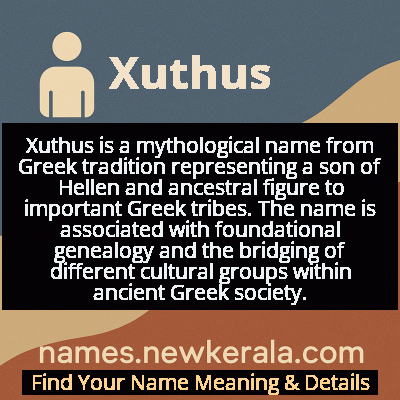Xuthus Name Meaning & Details
Origin, Popularity, Numerology Analysis & Name Meaning of Xuthus
Discover the origin, meaning, and cultural significance of the name XUTHUS. Delve into its historical roots and explore the lasting impact it has had on communities and traditions.
Name
Xuthus
Gender
Male
Origin
Greek
Lucky Number
5
Meaning of the Name - Xuthus
Xuthus is a mythological name from Greek tradition representing a son of Hellen and ancestral figure to important Greek tribes. The name is associated with foundational genealogy and the bridging of different cultural groups within ancient Greek society.
Xuthus - Complete Numerology Analysis
Your Numerology Number
Based on Pythagorean Numerology System
Ruling Planet
Mercury
Positive Nature
Adventurous, dynamic, curious, and social.
Negative Traits
Restless, impatient, inconsistent, prone to indulgence.
Lucky Colours
Green, white.
Lucky Days
Wednesday.
Lucky Stones
Emerald.
Harmony Numbers
1, 3, 9.
Best Suited Professions
Sales, marketing, travel, entertainment.
What People Like About You
Versatility, charisma, adventurous spirit.
Famous People Named Xuthus
Xuthus of Thessaly
Mythological King
Son of Hellen and founder of the Achaean and Ionian tribes through his sons Achaeus and Ion
Xuthus (Literary Character)
Mythological Figure
Featured in Euripides' play 'Ion' as the husband of Creusa and supposed father of Ion
Xuthus (Genealogical Figure)
Ancestral Hero
Pivotal figure in Greek genealogical traditions connecting Hellen to major tribal groups
Name Variations & International Equivalents
Click on blue names to explore their detailed meanings. Gray names with will be available soon.
Cultural & Historical Significance
In Athenian tradition, particularly as dramatized in Euripides' 'Ion', Xuthus's story takes on additional cultural significance. As a foreigner from Thessaly who marries the Athenian princess Creusa, he represents the complex relationship between autochthonous claims and foreign influences in Athenian identity. The play explores themes of divine intervention, mistaken parentage, and the establishment of royal lineages, with Xuthus serving as a catalyst for the revelation of Ion's true divine parentage. This narrative reflects broader Athenian concerns about purity of descent while acknowledging the reality of cultural and genetic mixing in the Greek world.
Extended Personality Analysis
Based on mythological portrayals, Xuthus exhibits characteristics of nobility, diplomatic skill, and a strong sense of familial duty. As a son of Hellen and husband to an Athenian princess, he demonstrates the ability to navigate complex social and political landscapes, suggesting traits of adaptability and cultural intelligence. His role in mythological genealogy indicates a person concerned with legacy and the continuation of family lines, pointing to traditional values and respect for ancestral traditions.
From a modern psychological perspective, the name Xuthus might be associated with leadership qualities rooted in heritage and tradition. The mythological figure shows resilience in maintaining his position despite being an outsider in Athens, suggesting inner strength and the ability to earn respect through character rather than mere birthright. His story involves both acceptance of unexpected circumstances (believing Ion to be his son) and eventual understanding of complex truths, indicating a personality capable of growth and reconciliation with reality.
Modern Usage & Popularity
In contemporary times, the name Xuthus is virtually nonexistent as a given name and remains confined to academic and classical contexts. It appears primarily in scholarly works on Greek mythology, classical literature courses, and specialized historical studies. The name has no presence in modern naming databases or popularity charts, reflecting its status as a purely mythological reference rather than a living naming tradition. When encountered today, it typically serves as an example in discussions of Greek genealogical mythology or as a character reference in studies of Euripidean drama, maintaining its relevance primarily within classical scholarship rather than practical naming usage.
Symbolic & Spiritual Meanings
Symbolically, Xuthus represents the interconnectedness of Greek tribal identities and the transmission of cultural heritage across generations. As a bridge figure between different regional and tribal groups, he embodies the concept of cultural mediation and the complex networks of relationship that defined Greek civilization. His position as both an insider (as Hellen's son) and outsider (in Athens) gives him symbolic value as a figure who transcends simple ethnic categories, representing instead the fluidity and complexity of identity in the ancient world. The name carries connotations of foundational relationships, ancestral responsibility, and the enduring power of genealogical connections in shaping both individual and collective identity.

